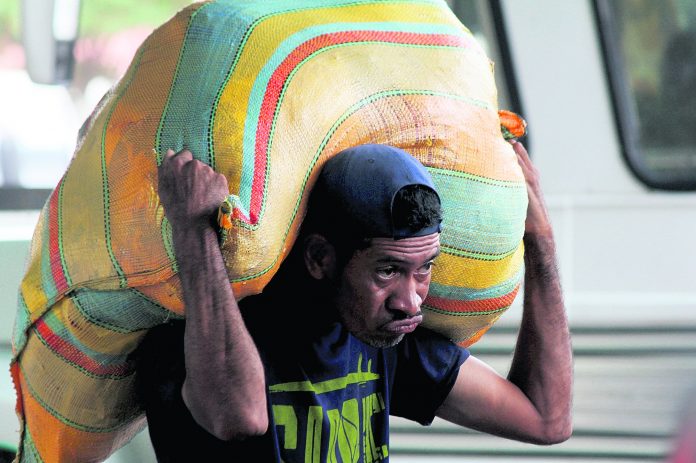
Midday is approaching and the bus terminal in this border town is in a frenzy.
Merchants heading for the center of Venezuela hop on buses and load them with sacks of rice, boxes of medicine, cartons of toothpaste and even car tires that they bought in neighboring Colombia. On the arrivals side, exhausted travelers descend from buses and make their way toward the border, where they will shop for food or get their passports stamped to leave Venezuela for good.
Amid the screams of street vendors and the pedestrian mayhem, dozens of young men with metal carts hustle back and forth between the bus terminal and the border, carrying suitcases and merchandise. They are known as “lomo taxistas” _ taxis of the lower back _ because they spend much of the day hauling around heavy loads on their backs.
“I didn’t expect to stay here, but I had to because I didn’t have more money to continue my journey,” said Richard Rondon, a lomo taxista from central Venezuela, who arrived in San Antonio last year.
Rondon said he makes around $8 a day hauling large sacks of goods around the San Antonio bus terminal, which is about four blocks from the border. It can be backbreaking work in extreme temperatures that often climb to 40 degrees Celsius (104 Fahrenheit), but the 26-year-old says itis better than staying in his home state of Aragua.
“Food has become very unaffordable there,” he said. “And it’s also hard to get a job.”
Food shortages and hyperinflation in Venezuela are pushing thousands of people to leave the country each day in search of a better life.
But many who have little money to migrate, or prefer to stay closer to home, are settling in border towns like San Antonio, where the informal economy of black market goods and street vending provide them with some work opportunities.
San Antonio’s mayor, William Gomez, says that over the past two years, the town’s population has grown from 66,000 to 113,000 due to the wave of internal migration. He says the lomo taxistas are one of several informal occupations that have popped up as more people arrive from the interior of Venezuela.
“These are hard-working young men,” said Gomez, who is from the Venezuela’s governing socialist party. “With this type of work, they are finding some relief from the economic blockade that has been imposed on Venezuela.”
At the bus terminal, Rondon blames Venezuela’s government and its economic policies for the country’s problems, saying that something “needs to change” so children don’t have to face such hardships.
He lives with his two small children and his pregnant wife in a room that the family rents for $3 a day. Power outages are frequent, like elsewhere in Venezuela’s border areas. Running water is available only once a week.
“It’s uncomfortable, because we also have to share the bathroom with other families,” said Francis Sosa, Rondon’s 20-year-old wife. “But here we can eat well. We had our own home in Aragua but it was tough to find food there.”
Rondon works every day from 7 a.m. to 9 p.m. to earn enough to pay the rent, afford some food and have some money left over for his childrens’ needs.
On his way home, he walks by stores that stopped selling clothes or electric appliances due to Venezuela’s crisis. Now their owners rent those spaces to migrants from central Venezuela who sleep on the floor for a couple dollars a night.
Rondon sometimes wonders if life would be better in nearby countries like Colombia or Peru. But he is also discouraged from moving when he sees penniless Venezuelans coming back home with tales of suffering and hardships.
“It’s hard for me to know what life abroad would be like,” he said. “While there is work, I will stay around here.”q



















